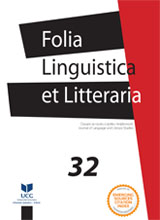RHIZOMATIC COSMOPOLITAN AND WILSONIAN RECURSIVE VISION IN JOE TURNER’S COME AND GONE
RHIZOMATIC COSMOPOLITAN AND WILSONIAN RECURSIVE VISION IN JOE TURNER’S COME AND GONE
Author(s): Roksana Dayani, Bahee HadaeghSubject(s): Studies of Literature, Comparative Study of Literature
Published by: Filološki fakultet, Nikšić
Keywords: August Wilson; Baudelaire’s flâneur; Benjamin’s flâneur; Deleuze and Guattari’s A Thousand Plateau; Joe Turner’s Come and Gone; rhizome
Summary/Abstract: Being the constant wanderer for the lost identity in the polyethnic land of America, African Americans bear striking resemblance to the figure of flâneur with dialectical image of local and cosmopolitan citizen of the universe. The spirit of flânerie proves its geographical historical expansion in both postmodern and African American context while its performative action navigates it in dramatic texts. Hence, Wilsonian characters identical with constant existential quest for the lost self can be African American incarnations of flâneur. Drawing on Baudelaire’s definition and Benjamin’s theory of flâneur, this study seeks to demonstrate possible manifestations of African American flâneur in August Wilson’s Joe Turner’s Come and Gone (1986). Moreover, through Deleuze and Guattari’s postmodern theoretical concept of rhizome in A Thousand Plateau (1987), the study aims to explore the postmodern manifestation of flâneur and consequently manifest how it functions to be the means for Wilsonian postmodern recursive dramatic vision that represents mysterious aspects of African Americans life. Flâneur’s versatility appropriates it to be the quintessential manifestation of African Americans inasmuch as the latter’s multifaceted African nature can accommodate the former’s flexibility.
Journal: Folia Linguistica et Litteraria
- Issue Year: 2020
- Issue No: 32
- Page Range: 7-25
- Page Count: 19
- Language: English

